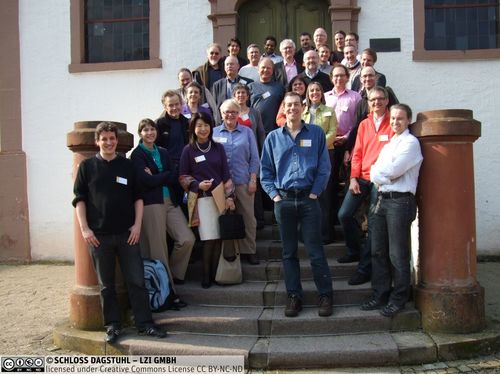Dagstuhl Seminar 09101
Interactive Information Retrieval
( Mar 01 – Mar 06, 2009 )
Permalink
Organizers
- Nicholas J. Belkin (Rutgers University - New Brunswick, US)
- Norbert Fuhr (Universität Duisburg-Essen, DE)
- Joemon Jose (University of Glasgow, GB)
- C. J. Keith van Rijsbergen (University of Glasgow, GB)
Contact
- Annette Beyer (for administrative matters)
Interactive information retrieval (IIR) systems are a commodity nowadays; however,the scientific foundation of this type of system is rather limited. Information retrieval(IR) theory has widely ignored this area, and cognitive IR approaches have not yet led to detailed specifications for IIR systems. Within this context, we organized a week long seminar at Dagstuhl during March 2009 and the activities and recommendations are described in this report.
The general idea was to collect the state of the art in IIR research, and to define a research agenda for further work in this area. For this purpose, we brought together experts from the related areas such as information science, cognitive science, interactive IR, theoretical IR and humancomputer interaction (HCI). We took a broad approach to the problem of IIR by highlighting latest results and naming crucial research issues. Based on these contributions, we identified open research problems and then point out steps towards resolving these problems.
We had 32 participants from across the globe working on issues related to interactive information retrieval. The workshop started on a Monday and finished on Friday. The organization of the workshop included keynote talks (3), short talks from participants, demonstration sessions, special topic sessions, and breakout sessions. In addition, we had an afternoon visit to a nearby ancient city.
The technical activities focused around: evaluation methodology in information retrieval; adaptive and personalized retrieval; context and interfaces; and, semantic search. The three keynote talks were on: Cognitive & Context Modeling for Interactive IR; Evaluation of Interactive Retrieval systems; User Interfaces for Interactive Information Retrieval.
In the closing session of the workshop, the group identified many research areas and highlighted the following recommendations:
- Further effort is needed to define an evaluation methodology that can effectively evaluate context sensitive information retrieval systems. In this regard, the role of interactive test collections needs to be explored. In addition, the simulated evaluation methodology needs to be studied further.
- Related to this the development of new evaluation measures, which evaluate system performance in terms of the entire information seeking interaction, rather than only in terms of the response to a single query.
- There is an urgent need to define the concept of context and to study its exploitation in interactive information retrieval systems.
- Theoretic models of interactive retrieval systems are very important. Serious efforts are needed to develop models that fits various interactive search scenarios
- In order to reduce the effort for performing useroriented evaluations, cooperation between research groups should be enforced and appropriate evaluation initiatives be launched.
- Maristella Agosti (University of Padova, IT) [dblp]
- Marcia J. Bates (UCLA, US)
- Nicholas J. Belkin (Rutgers University - New Brunswick, US) [dblp]
- Ann Blandford (University College London, GB) [dblp]
- Norbert Fuhr (Universität Duisburg-Essen, DE) [dblp]
- Lynda Hardman (CWI - Amsterdam, NL) [dblp]
- Kalervo Järvelin (University of Tampere, FI) [dblp]
- Hans-Christian Jetter (Universität Konstanz, DE) [dblp]
- Thorsten Joachims (Cornell University, US) [dblp]
- Matthias Jordan (Universität Duisburg-Essen, DE)
- Joemon Jose (University of Glasgow, GB)
- Noriko Kando (National Institute of Informatics - Tokyo, JP) [dblp]
- Jussi Karlgren (Swedish Institute of Computer Science - Kista, SE) [dblp]
- Diane Kelly (University of North Carolina - Chapel Hill, US) [dblp]
- Claus-Peter Klas (FernUniversität in Hagen, DE) [dblp]
- Sascha Kriewel (Universität Duisburg-Essen, DE)
- Massimo Melucci (University of Padova, IT)
- Natasa Milic-Frayling (Microsoft Research UK - Cambridge, GB) [dblp]
- Stefano Mizzaro (University of Udine, IT)
- Ragnar Nordlie (Oslo University College, NO) [dblp]
- Andreas Rauber (TU Wien, AT) [dblp]
- Harald Reiterer (Universität Konstanz, DE) [dblp]
- Stefan M. Rüger (The Open University - Milton Keynes, GB) [dblp]
- Mark Sanderson (Sheffield University, GB) [dblp]
- Ralf Schenkel (Universität des Saarlandes, DE) [dblp]
- Nicu Sebe (University of Amsterdam, NL) [dblp]
- John Tait (Tech Gate - Wien, AT) [dblp]
- Pertti Vakkari (University of Tampere, FI) [dblp]
- C. J. Keith van Rijsbergen (University of Glasgow, GB) [dblp]
- Christian Wolff (Universität Regensburg, DE)
- Christa Womser-Hacker (Universität Hildesheim, DE) [dblp]
- Jürgen Ziegler (Universität Duisburg-Essen, DE) [dblp]
Classification
- data bases
- information retrieval
- society
- HCI
Keywords
- information retrieval models
- cognitive information retrieval approaches
- HCI
- interactive computation
- collaboration
- social media
- social networks
- multimodal interaction


